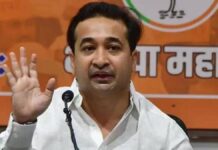X: @the_news_21
In a significant move, the Maharashtra government has approved a report to extend reservation to Marathas beyond the 50 per cent cap in a special session held by the Maharashtra cabinet on Tuesday.
The report, endorsed by the Mahayuti government led by Eknath Shinde, mirrors the Socially and Educationally Backward Classes Act, 2018, previously introduced by the Devendra Fadnavis government. This marks the third instance in a decade that legislation for Maratha quota has been introduced in the state.
The decision to convene a special session was spurred by Maratha quota activist Manoj Jarange Patil, currently on a hunger strike at Antarwali Saarati village in Jalna district.
The reservation extension follows a report submitted by the Maharashtra Backward Class Commission (MBCC) chaired by Justice (Retired) Sunil Shukre. The MBCC’s report highlighted the need for Maratha quota based on social and educational backwardness.
Currently, the state allocates 10 per cent reservation for the Economically Weaker Section (EWS), with Marathas being the primary beneficiaries, accounting for 85 per cent of the quota.
The Maharashtra State Backward Class Commission conducted a swift survey of approximately 2.5 crore households in just nine days to assess the social and educational backwardness of the Maratha community.
Based on its findings, the commission recommended a 10 per cent reservation for Marathas in education and employment, akin to the provision made in 2018 by the previous government.
The groundwork for Maratha reservation dates back to June 2017 when the Devendra Fadnavis government established the Maharashtra State Backward Class Commission, tasked with analyzing the social, financial, and educational status of the Maratha community. The commission’s report, submitted in November 2018, classified Marathas as a socially and educationally backward class (SEBC).
Emphasizing the adherence to legal provisions, Maharashtra Chief Minister Eknath Shinde reiterated the government’s commitment to implementing Maratha reservation, following the presentation of the report during the special assembly session convened on Tuesday.
“How Marathas can be given selective treatment, ignoring other castes in society? Why such survey was not conducted for each & every caste in society before coming to the conclusion?” Said, Vinod Tiwari, President of Council for Protection of Rights.








can i get generic clomid for sale can i purchase clomid without a prescription cost of clomiphene pill clomiphene bula profissional cheap clomid pills clomiphene brand name can you get clomiphene prices
I couldn’t resist commenting. Warmly written!
This is the gentle of writing I in fact appreciate.
order zithromax 250mg generic – buy zithromax 500mg generic buy flagyl 400mg online
where can i buy rybelsus – rybelsus 14 mg us buy periactin 4mg online
domperidone tablet – sumycin 250mg for sale buy generic cyclobenzaprine
oral augmentin 1000mg – atbioinfo.com buy generic acillin
order nexium 20mg pills – anexa mate esomeprazole 40mg drug
buy warfarin 2mg sale – blood thinner buy generic losartan online
purchase mobic generic – https://moboxsin.com/ mobic 15mg canada
prednisone 5mg for sale – https://apreplson.com/ buy deltasone 40mg pill
natural pills for erectile dysfunction – fast ed to take gnc ed pills
buy amoxil generic – combamoxi.com buy generic amoxicillin
purchase cenforce – https://cenforcers.com/ cenforce brand
buy ranitidine without prescription – site order ranitidine 150mg pills
cialis 5mg cost per pill – https://strongtadafl.com/# tadalafil citrate research chemical
Thanks for putting this up. It’s okay done. este sitio
This is the description of serenity I enjoy reading. buy prednisone without a prescription
I’ll certainly return to review more. https://ursxdol.com/amoxicillin-antibiotic/
This is the kind of advise I recoup helpful. https://aranitidine.com/fr/acheter-cenforce/
The thoroughness in this break down is noteworthy. https://ondactone.com/product/domperidone/
I couldn’t hold back commenting. Warmly written!
buy colcrys medication
I couldn’t turn down commenting. Profoundly written! http://zgyhsj.com/space-uid-977929.html
order forxiga 10mg – order dapagliflozin 10mg sale dapagliflozin 10 mg for sale
xenical cost – site order xenical 60mg
This is the tolerant of delivery I find helpful. http://www.orlandogamers.org/forum/member.php?action=profile&uid=29982
You can protect yourself and your stock nearby being cautious when buying prescription online. Some druggist’s websites function legally and put forward convenience, reclusion, rate savings and safeguards for purchasing medicines. buy in TerbinaPharmacy https://terbinafines.com/product/coumadin.html coumadin
Thanks towards putting this up. It’s okay done. buy amlodipine 10mg generic
Thanks towards putting this up. It’s understandably done.
kuwin sở hữu kho game đa dạng từ slot đến trò chơi bài đổi thưởng, mang đến cho bạn những giây phút giải trí tuyệt vời.
Khám phá thế giới giải trí trực tuyến đỉnh cao tại MM88, nơi mang đến những trải nghiệm cá cược thể thao và casino sống động.
online real money casinos
best online casinos usa
best live casino online games
betmgm CT https://betmgm-play.com/ betmgm super bowl promo
mcluck OR mcluckcasinogm mcluck casino login
Featuring Paris Hilton as a kind papal nuncio in the recent and now live wholesaler tables, best casinos remains a cap sweepstakes casino choice. It offers free coins as a service to clowning womanize coupled with the arousing way out to deliver prizes from Sweepstakes Coins.